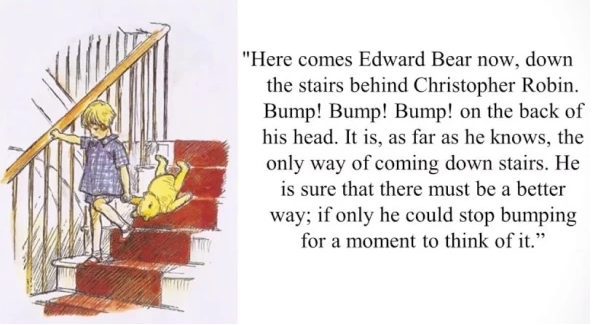
“Here is Edward Bear, coming downstairs now, bump, bump, bump, on the back of his head, behind Christopher Robin. It is, as far as he knows, the only way of coming down stairs, but sometimes he feels there really is another way, if only he could stop bumping for a moment and think of it.” –Winnie the Pooh
Leaders in every field emphasize the importance of embracing change. Yet the only people who seem to really welcome change are babies with dirty diapers and busy cashiers. No matter how helpful or positive the change, people tend to avoid or resist change. So let’s face it, change is disturbing. The natural tendency is to stick with what we know, play it safe, and gravitate toward the familiar. Overtly and covertly, we resist. Safety, control, what is known is much more comfortable. Yet has God called us to the comfortable? – The wide and easy path? Has the One who calls Himself “Our Provider” given us the assignment of seeking a safe and secure life? Is that what it means to take up our cross daily?
God is leading B4Ters into a new model of doing missions. When I speak about changes that need to be made, changes God has clearly poured into my mind and heart, those who are steeped in the traditions of mission at times point out to me Conventional Wisdom. Conventional Wisdom is cautious, exhorting us to “slow down” and “play it safe”. Conventional Wisdom may seem prudent, as it is tied to the “lessons” of the past. It appears to inject a little control into an otherwise uncomfortable world. But these attempts to stay in a comfort zone are not without their costs: they extinguish the sparks of innovation, enthusiasm, and creativity, that are so necessary for progress. And I wonder, is Conventional Wisdom – God’s Wisdom? Conventional Wisdom may just be our own worst enemy.
Get Out of the Box
Consider: what do you do when the Master has called you to reach the unreached, but having a conventional style gets you barred from reaching the very people you are called to preach to? John Wesley faced this very problem. The leaders of his day felt biblical preaching should be done in a church, behind a pulpit. Their limited view of doing outreach was based on their own experiences. They were living in a box, unable to see beyond what they already knew. Wesley stepped outside of this box. Barred from his city’s pulpits, he bought a horse and rode out to the countryside where he began open air preaching. Wesley fulfilled God’s assignment without worrying about the traditions and structures of the church. He did not live boxed in by the wisdom or best practices of others. He did not allow the narrow mindedness of others to hinder God’s assignment of evangelizing and discipling the masses. Wesley listened to God’s voice and stepped out of the box, believing the Spirit of God could manifest Himself in unexplored ways, reaching beyond the structured and controlled institutions and their liturgies. Wesley appreciated the church, but he did not feel a need to reform it. He understood the limitations of traditional methods of outreach and climbed outside the box to reach the less reached. First and foremost he obeyed what God was telling him. He focused his efforts and resources on implementing new strategies for reaching those who were beyond the reach of the Gospel.
Mission agencies now have over two hundred years of traditions, values, policies and practices. During the nineteenth and twentieth centuries, mission organizations enjoyed the protection of Western governments and the donations of wealthy Western churches. Having been built on such a foundation, mission agencies are finding it hard to remodel themselves to fit today’s world. Many agencies embrace strategies and methods that contrast with those of the world around them. The ways of bringing missions and business together are difficult. A paradigm shift is needed. We must break out of our boxes. We need to hear God.
It is a waste of time and resources to train people to learn more and better things, when the context in which the learner thinks has not shifted. It is like trying to add ten new stories to a building without making adjustments to the foundation.
Put Away Old Foundations for New Structures
The past weeks I’ve been writing about working with millennials. We cannot equip and send millennials by simply imparting our knowledge to them. A major paradigm shift is needed if millennials are going to pick up His cross and carry it to the ends of the earth. If leaders are going to look at things differently, we must willingly choose to re-look at familiar situations from a totally different point of view. Old foundations need to be put aside so new structures may be built. Simply revamping former strategies and methodologies will not work. We need more than superficial changes. We need to wake up to the fact that we cannot rely on the ‘tried and true’ – Conventional Wisdom, because what was tried yesterday is no longer true today. New models of sending workers need to be attempted. Like Wesley, we need to listen to and then obey God. I am confident that if we listen well, He will tell us how we can help Edward Bear to find a better way to get down the stairs.
![]()
PATRICK LAI and his family have worked in SE Asia for other 37 years. His experience in doing business with Jesus has brought him to understand the meaning of work and worship in the marketplace. He started 14 businesses in four countries, six of which are still operating. Patrick and his wife, May, mentor and coach businesspeople working where there are few or no Christians. Check out Patrick’s latest book, Workship, now available in paperback and e-book.
- Blog Home
- /
- Transformation
- /
- HELPING POOH BEAR
